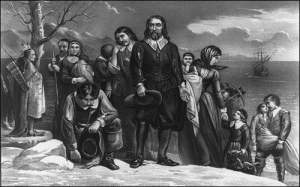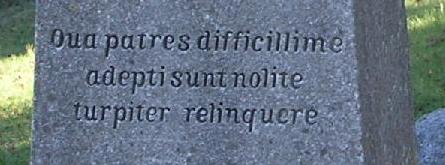Although The Pilgrim’s Progress is not a history of New England, these lines of John Bunyan could have described William Bradford and his fellow Pilgrims.

Who would true valour see,
Let him come hither;
One here will constant be,
Come wind, come weather
There’s no discouragement
Shall make him once relent
His first avowed intent
To be a pilgrim.
In The Answerable Courage of William Bradford Jeffrey Lord detailed the setbacks and trials the Pilgrims had of simply getting to Cape Cod, let alone going through their adversities in establishing a home in an unfamiliar land. William Bradford and his fellow Pilgrims answered their challenges with courage—a courage that remains one of their most significant legacies to us. It is not merely a legacy of the benefits we have known because of their courage, it is a legacy that is both example and challenge. To encourage is to inspire with courage, and their perseverance in the face of severe suffering is truly one of the most moving, inspiring and humbling examples of courage in our nation’s history.
Their courage is also a challenge that asks several questions of us. How will we answer their courage? How will we answer our own setbacks and trials? How would we even be able to find courage comparable to theirs? We each must learn the answer ourselves to the first two questions. The Pilgrims have left us the answer to the last. William Bradford finishes his chapter on their safe arrival at Cape Codd in 1620 by saying:
May not and ought not the children of these fathers rightly say:
Our faithers were Englishmen which come over this great ocean, and were ready to perish in this willdernes; but they cried unto the Lord, and he heard their voyce, and looked on their adversitie, etc. Let them therfore praise the Lord, because he is good, and his mercies endure for ever. Yea, let them which have been redeemed of the Lord, shew how he hath delivered them from the hand of the oppressour. When they wandered in the deserte willdernes out of the way, and found no citie to dwell in, both hungrie, and thirstie, their sowle was overwhelmed in them. Let them confes before the Lord his loving kindnes, and his wonderfull works before the sons of men.
They were courageous because they knew God. He was the wellspring of their strength and perseverance. That hot and parched summer of 1623—that time when they feared their crops might fail—Governor Bradford appointed a day of humiliation, fasting, and prayer. In Sweet and Gentle Showers I told the story of that day and of God’s miraculous answer. Two weeks later they had a day of giving thanks to God for their deliverance. When they wrote of their utter dependence on God, it wasn’t just words, it was the reality of their lives. In September of 1623 Edward Winslow wrote:
Wherein others may see that, which we are bound to acknowledge, viz., That if ever any people, in these later Ages, were upheld, by the Providence of GOD, after a more special manner than others; then we: and therefore are the more bound to celebrate the memory of his goodness with everlasting thankfulness….
How few, weak, and raw were we at our first beginning, and there settling; and in the midst of barbarous enemies! Yet GOD wrought our peace for us.
How often have we been at the pit’s brim, and in danger to be swallowed up: yea not knowing, till afterward, that we were in peril? And yet GOD preserved us. Yea, and from how many that we yet know not of; he, that knoweth all things, can best tell.
So that, when I seriously consider of things, I cannot but think that GOD hath a purpose to give that land, as an inheritance, to our nation….
The Pilgrims endured circumstances that cause us to blench just by reading about them. We have yet to face anything comparable. They persevered by God’s help. We will never be able to do so without Him.
If you have run with footmen and they have tired you out,Then how can you compete with horses?If you fall down in a land of peace,How will you do in the thicket of the Jordan?Jeremiah 12:5
The monument at the grave of William Bradford has one inscription in Hebrew:
Jehovah is our help
Another in Latin:
What our fathers with so much difficulty secured,
do not basely relinquish
__________
Of Plymouth Plantation, An Electronic Edition, William Bradford 1590-1657 (125). Original Source: Bradford’s History of Plymouth Plantation, 1606-1646. Ed. William T. Davis. New York: Charles Scribner’s Sons, 1908. Copyright 2003. This text is freely available provided the text is distributed with the header information provided.
Edward Winslow, Good News From New England, in The Story of The Pilgrim Fathers, 1606-1623 A.D.; as told by Themselves, their Friends, and their Enemies, Edward Arber, ed. (Houghton, Mifflin & Co., Boston MA: 1897) 580–581.
For further explanation of primary and secondary sources see: http://www.princeton.edu/~refdesk/primary2.html


